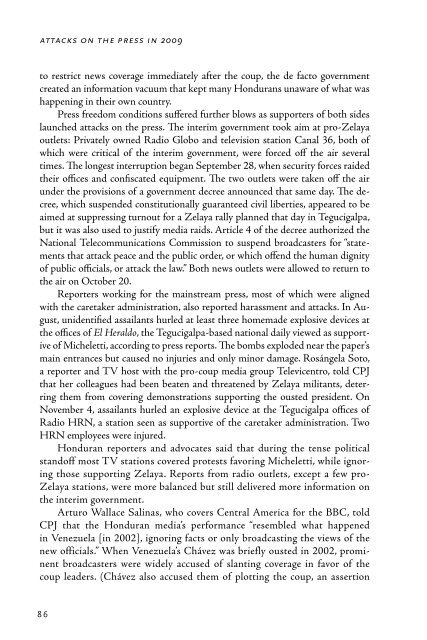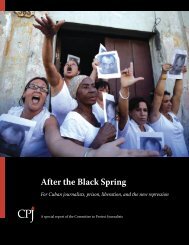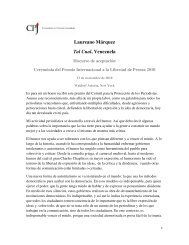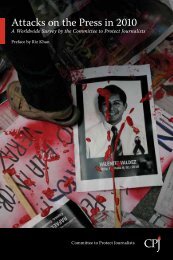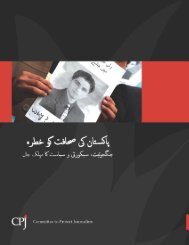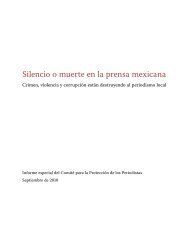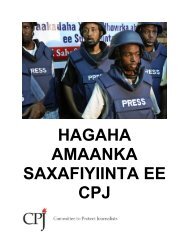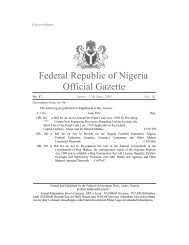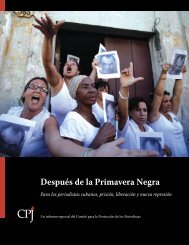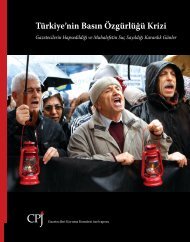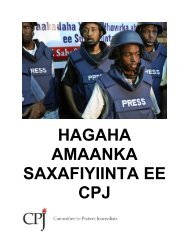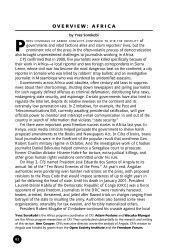Attacks on the Press - Committee to Protect Journalists
Attacks on the Press - Committee to Protect Journalists
Attacks on the Press - Committee to Protect Journalists
- No tags were found...
Create successful ePaper yourself
Turn your PDF publications into a flip-book with our unique Google optimized e-Paper software.
attacks <strong>on</strong> <strong>the</strong> press in 2009americas: h<strong>on</strong>duras<strong>to</strong> restrict news coverage immediately after <strong>the</strong> coup, <strong>the</strong> de fac<strong>to</strong> governmentcreated an informati<strong>on</strong> vacuum that kept many H<strong>on</strong>durans unaware of what washappening in <strong>the</strong>ir own country.<strong>Press</strong> freedom c<strong>on</strong>diti<strong>on</strong>s suffered fur<strong>the</strong>r blows as supporters of both sideslaunched attacks <strong>on</strong> <strong>the</strong> press. The interim government <strong>to</strong>ok aim at pro-Zelayaoutlets: Privately owned Radio Globo and televisi<strong>on</strong> stati<strong>on</strong> Canal 36, both ofwhich were critical of <strong>the</strong> interim government, were forced off <strong>the</strong> air severaltimes. The l<strong>on</strong>gest interrupti<strong>on</strong> began September 28, when security forces raided<strong>the</strong>ir offices and c<strong>on</strong>fiscated equipment. The two outlets were taken off <strong>the</strong> airunder <strong>the</strong> provisi<strong>on</strong>s of a government decree announced that same day. The decree,which suspended c<strong>on</strong>stituti<strong>on</strong>ally guaranteed civil liberties, appeared <strong>to</strong> beaimed at suppressing turnout for a Zelaya rally planned that day in Tegucigalpa,but it was also used <strong>to</strong> justify media raids. Article 4 of <strong>the</strong> decree authorized <strong>the</strong>Nati<strong>on</strong>al Telecommunicati<strong>on</strong>s Commissi<strong>on</strong> <strong>to</strong> suspend broadcasters for “statementsthat attack peace and <strong>the</strong> public order, or which offend <strong>the</strong> human dignityof public officials, or attack <strong>the</strong> law.” Both news outlets were allowed <strong>to</strong> return <strong>to</strong><strong>the</strong> air <strong>on</strong> Oc<strong>to</strong>ber 20.Reporters working for <strong>the</strong> mainstream press, most of which were alignedwith <strong>the</strong> caretaker administrati<strong>on</strong>, also reported harassment and attacks. In August,unidentified assailants hurled at least three homemade explosive devices at<strong>the</strong> offices of El Heraldo, <strong>the</strong> Tegucigalpa-based nati<strong>on</strong>al daily viewed as supportiveof Micheletti, according <strong>to</strong> press reports. The bombs exploded near <strong>the</strong> paper’smain entrances but caused no injuries and <strong>on</strong>ly minor damage. Rosángela So<strong>to</strong>,a reporter and TV host with <strong>the</strong> pro-coup media group Televicentro, <strong>to</strong>ld CPJthat her colleagues had been beaten and threatened by Zelaya militants, deterring<strong>the</strong>m from covering dem<strong>on</strong>strati<strong>on</strong>s supporting <strong>the</strong> ousted president. OnNovember 4, assailants hurled an explosive device at <strong>the</strong> Tegucigalpa offices ofRadio HRN, a stati<strong>on</strong> seen as supportive of <strong>the</strong> caretaker administrati<strong>on</strong>. TwoHRN employees were injured.H<strong>on</strong>duran reporters and advocates said that during <strong>the</strong> tense politicalstandoff most TV stati<strong>on</strong>s covered protests favoring Micheletti, while ignoringthose supporting Zelaya. Reports from radio outlets, except a few pro-Zelaya stati<strong>on</strong>s, were more balanced but still delivered more informati<strong>on</strong> <strong>on</strong><strong>the</strong> interim government.Arturo Wallace Salinas, who covers Central America for <strong>the</strong> BBC, <strong>to</strong>ldCPJ that <strong>the</strong> H<strong>on</strong>duran media’s performance “resembled what happenedin Venezuela [in 2002], ignoring facts or <strong>on</strong>ly broadcasting <strong>the</strong> views of <strong>the</strong>new officials.” When Venezuela’s Chávez was briefly ousted in 2002, prominentbroadcasters were widely accused of slanting coverage in favor of <strong>the</strong>coup leaders. (Chávez also accused <strong>the</strong>m of plotting <strong>the</strong> coup, an asserti<strong>on</strong><strong>the</strong>y denied.)Alexis Quiroz, executive direc<strong>to</strong>r of <strong>the</strong> <strong>Committee</strong> for Freedom of Expressi<strong>on</strong>(C-Libre), a H<strong>on</strong>duran press freedom group, said slanted coverage could beseen in Zelaya’s first, unsuccessful attempt <strong>to</strong> return <strong>to</strong> H<strong>on</strong>duras. After <strong>the</strong> H<strong>on</strong>duranmilitary blocked <strong>the</strong> airport’s runway <strong>to</strong> prevent Zelaya’s flight from landing,soldiers opened fire <strong>on</strong> his supporters, leaving at least two dead and dozensinjured. Most TV stati<strong>on</strong>s, Quiroz said, ignored <strong>the</strong> news and aired an official,interim government event instead.In August, Zelaya accused several media owners of planning <strong>the</strong> coup. Henamed two former presidents—Carlos Rober<strong>to</strong> Flores Facussé, owner of <strong>the</strong>daily La Tribuna, and Ricardo Maduro, a principal in Radio Cadena Voces—al<strong>on</strong>g with José Rafael Ferrari, owner of <strong>the</strong> Televicentro and Emisoras Unidasgroups, and Jorge Canahuati Llarach, a principal in <strong>the</strong> dailies El Heraldoand La Prensa. But Zelaya provided no evidence of any direct involvement in<strong>the</strong> takeover.Tensi<strong>on</strong>s fur<strong>the</strong>r escalated after Zelaya secretly returned from exile <strong>on</strong> September21 and sought refuge in <strong>the</strong> Brazilian Embassy. Zelaya’s return created anervous standoff as he demanded <strong>to</strong> retake <strong>the</strong> presidency and Micheletti threatenedhim with arrest if he set foot outside <strong>the</strong> embassy. After intensive internati<strong>on</strong>alnegotiati<strong>on</strong>s, <strong>the</strong> interim government agreed <strong>to</strong> allow Zelaya <strong>to</strong> return<strong>to</strong> office after <strong>the</strong> November electi<strong>on</strong> so he could serve out <strong>the</strong> remaining twom<strong>on</strong>ths of his term. Under <strong>the</strong> deal, <strong>the</strong> presidential vote would be recognized byboth sides, and nei<strong>the</strong>r Zelaya nor Micheletti would be candidates. But <strong>the</strong> agreementso<strong>on</strong> fell apart: Zelaya urged his supporters <strong>to</strong> boycott <strong>the</strong> electi<strong>on</strong>, and helater alleged fraud in <strong>the</strong> balloting. C<strong>on</strong>gress, in turn, voted in December <strong>to</strong> blockZelaya’s reinstatement.Throughout, <strong>the</strong> political dispute was echoed in media advertising. As par<strong>to</strong>f a campaign intended <strong>to</strong> damage Zelaya’s reputati<strong>on</strong>, <strong>the</strong> interim governmentproduced a number of televisi<strong>on</strong> ads alleging that <strong>the</strong> ousted presidenthad s<strong>to</strong>len milli<strong>on</strong>s from <strong>the</strong> Central Bank. On <strong>the</strong> o<strong>the</strong>r side, analysts noted,Zelaya persuaded media allies such as Radio Globo and Canal 36 <strong>to</strong> air hisunusual, unsubstantiated allegati<strong>on</strong>s that Israeli commandos had been hired<strong>to</strong> murder him.Two reporters were killed in unclear circumstances. Rafael Munguía Ortiz,a corresp<strong>on</strong>dent for Radio Cadena Voces, was killed in a drive-by shooting in<strong>the</strong> northwestern <strong>to</strong>wn of San Pedro Sula in March, according <strong>to</strong> news reports.In July, an unidentified assailant shot broadcast and newspaper reporter GabrielFino Noriega as he was leaving radio stati<strong>on</strong> Estelar in <strong>the</strong> nor<strong>the</strong>rn <strong>to</strong>wn of SanJuan Pueblo, police <strong>to</strong>ld CPJ. No arrests were reported in ei<strong>the</strong>r case. CPJ wasinvestigating <strong>the</strong> deaths <strong>to</strong> determine whe<strong>the</strong>r <strong>the</strong>y were work-related.8 68 7


